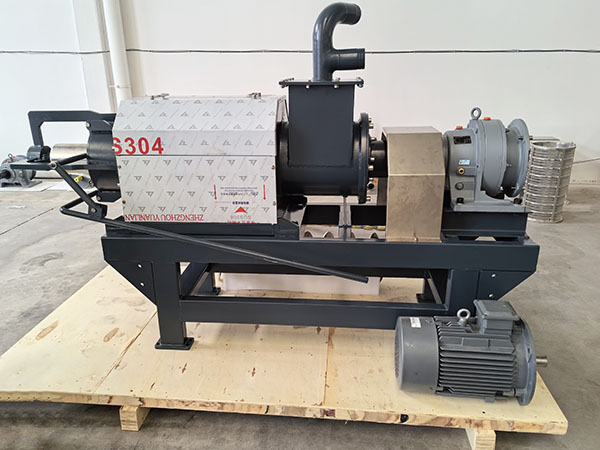In the realm of modern agriculture, the efficient management of manure is a critical aspect that directly impacts both environmental sustainability and farm productivity. Manure, while being a valuable source of nutrients for crops, also presents challenges due to its high water content and potential environmental risks. Solid-liquid separation emerges as a pivotal process in manure treatment, offering a solution to mitigate these challenges and promote a more sustainable approach to farming.

Understanding Manure Composition:
Manure is a complex mixture of organic and inorganic materials, including animal feces, urine, bedding materials, and leftover feed. The liquid component of manure contains dissolved nutrients like nitrogen and phosphorus, which, when not managed properly, can contribute to water pollution and harm aquatic ecosystems. Additionally, the solid fraction, rich in organic matter, can be utilized as a valuable soil amendment.
Need for Solid-Liquid Separation:
Traditional manure management involves the direct application of raw manure to fields. While this provides nutrients to crops, it also poses risks of nutrient runoff, groundwater contamination, and emission of greenhouse gases. Solid-liquid separation addresses these issues by breaking down manure into distinct fractions, allowing for targeted nutrient application and minimizing environmental impacts.
Separation Process:
Solid-liquid separation involves the mechanical separation of the solid and liquid components of manure. Various methods are employed, such as sedimentation, mechanical screens, and centrifugation. Tianzhong Machinery offers screw press separator and sloped screen separator for manure separation. These methods exploit the differences in particle size, density, and settling rates to achieve effective separation.
Benefits of Solid-Liquid Separation:
1. **Nutrient Management: ** By separating the liquid and solid fractions, farmers gain better control over nutrient application. Liquid portions, containing soluble nutrients, can be applied more precisely in terms of timing and quantity, reducing the risk of nutrient leaching and runoff.
2. **Improved Soil Health: ** The solid fraction, often rich in organic matter, can be utilized as a nutrient-dense soil amendment. Its application enhances soil structure, water retention, and microbial activity, contributing to overall soil health and fertility.
3. **Reduced Environmental Impact: ** Solid-liquid separation significantly reduces the environmental footprint of manure management. By controlling nutrient release and minimizing runoff, it helps protect water quality, safeguarding aquatic ecosystems and preventing the eutrophication of water bodies.
4. **Odor Reduction: ** The solid liquid separation process also aids in reducing the offensive odors associated with raw manure. By isolating and treating the solid fraction, the volatile compounds responsible for unpleasant smells are mitigated, creating a more neighbor-friendly and environmentally sound approach to manure management.
5. **Energy Recovery: ** Some separation technologies can potentially allow for the extraction of biogas from the liquid fraction, contributing to on-farm energy production. This adds an extra layer of sustainability by utilizing manure as a renewable energy source.
Challenges and Considerations:
While solid-liquid separation presents numerous benefits, it is not without its challenges. Initial investment costs, operational complexity, and the need for regular maintenance can be barriers for some farmers. Moreover, the effectiveness of separation methods can vary based on the characteristics of the manure, requiring a tailored approach for different livestock operations.
Conclusion:
Solid-liquid separation in manure treatment stands as a beacon of innovation in sustainable agriculture. By addressing the environmental concerns associated with traditional manure management, it allows for a more precise and controlled application of nutrients while simultaneously yielding valuable organic matter for soil improvement. As the agricultural industry continues to evolve, embracing technologies and practices that enhance both productivity and environmental stewardship becomes imperative. Solid-liquid separation is a testament to this evolution, offering a pathway to harmonize the nutrient needs of crops with the imperative to protect our ecosystems. As farmers, researchers, and policymakers collaborate to refine and implement these technologies, the future of manure management holds the promise of a more sustainable and resilient agricultural landscape.
Previous: What are the key safety features incorporated into the machine's design?
Next: None.
Copyright:@2020-2021
Comments Please sign in or sign up to post.
0
0 of 500 characters used